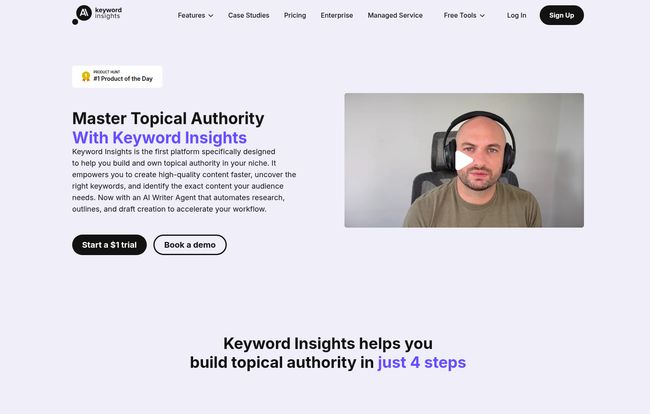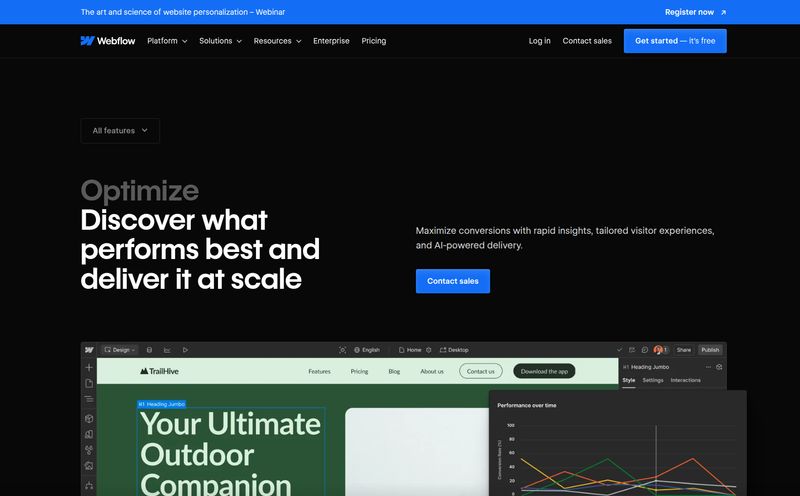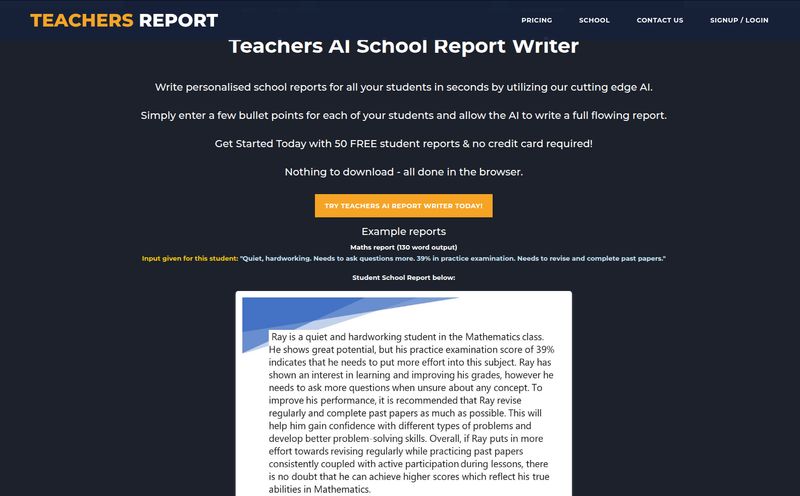The SEO tool market is… crowded. Every week, it feels like a new, shiny platform pops up promising to “revolutionize” our workflows with the “power of AI.” Most of them are just repackaged versions of the same old thing, offering slightly different UIs for the same old data. I’ve seen it all, and frankly, it takes a lot to impress me these days.
So, when I first heard about Keyword Insights, I was skeptical. Another tool claiming to help build topical authority? Sure. But I kept hearing whispers about it in some of my private SEO groups. People I respect were saying it actually worked differently. My curiosity got the better of me. I mean, the chase for topical authority is the current holy grail of content SEO, right? It's the difference between being a one-hit-wonder on the SERPs and becoming the go-to source that Google trusts implicitly.
So I shelled out for the trial and put it through its paces. And, well, I have some thoughts. This isn’t going to be one of those bland, feature-list reviews. This is my real, in-the-trenches take after kicking the tires for a while.

Visit Keyword Insights
First Off, What Is Keyword Insights Actually Trying to Do?
Before we get into the nitty-gritty, you have to understand the philosophy here. Keyword Insights isn’t just another keyword finder. It’s built from the ground up to help you dominate a whole topic, not just rank for one or two vanity keywords. Think of it less like a metal detector for finding a few coins and more like a full-on geological survey map that shows you where all the gold veins are buried and how they connect.
It’s designed to answer the big questions: What does my audience really want to know about this subject? What are all the sub-topics and related questions I need to cover? And how can I structure my content so Google sees me as an undisputed expert? It’s a workflow platform that takes you from the messy brainstorming phase all the way to a published, optimized article.
The Features That Genuinely Made Me Sit Up and Pay Attention
Okay, let's talk about the fun stuff. A tool is only as good as its features, and this is where Keyword Insights starts to pull away from the pack.
The Magic of SERP-Based Keyword Clustering
This is the absolute heart of the platform for me. We've all done keyword research, ended up with a spreadsheet of 5,000 terms, and then had a mini existential crisis trying to figure out how to group them. Old-school tools group keywords based on shared words. But that’s not how people search, and it’s not how Google understands content.
Keyword Insights does it differently. It analyzes the live SERPs for your keywords and groups them based on which terms bring up similar search results. If Google is ranking the same pages for “best running shoes for flat feet” and “supportive running shoes for overpronation,” the tool knows those two queries have the same intent. They belong in the same article. This is a game-changer. It takes the guesswork out of content structure and helps you avoid keyword cannibalization before you even write a single word. It’s just… smart.
Content Briefs That Aren't Just Word Count Suggestions
I have a love-hate relationship with content briefs. They’re necessary for scaling with a team, but most AI-generated briefs are laughably basic. “Write 1500 words and include these 10 keywords.” Thanks, super helpful.
The briefs in Keyword Insights are different. Because they're born from that SERP-based clustering, they provide a genuinely useful blueprint. They suggest headings, questions to answer (pulled from People Also Ask, Reddit etc.), and terms to include, all based on what's already ranking. It cuts down the manual SERP analysis I used to spend hours on. It's not perfect, you still need a human brain to put it all together cohesively, but it gets you 80% of the way there in a fraction of the time.
The AI Writer A Surprisingly Capable Assistant
I know, I know. Another AI writer. Call me old-fashioned, but I still believe the best content is written by humans who have actual experiences and a point of view. However, I’m also a realist who has deadlines to meet. The AI Writing Assistant here is pretty solid for what it is. It can take the content brief and generate a first draft pretty quickly. Is it publish-ready? No. God, no. But it’s a fantastic starting point for smashing through writer’s block and getting the basic structure down on paper. Think of it as a junior writer who does the initial research and drafting, and you’re the senior editor who comes in to add the nuance, storytelling, and polish. A very useful cog in the machine.
Okay, It's Not Perfect. Let's Talk About the Downsides.
No tool is a silver bullet, and I wouldn't be giving you an honest review if I didn't point out the things that made me grumble a little.
The main thing you’ll notice is the credit-based system. Pretty much everything you do—running a cluster report, generating a brief, writing with the AI—costs credits. On one hand, I get it. It’s a “pay for what you use” model. If you have a light month, you’re not wasting a huge subscription fee. On the other hand, it can feel a bit like being at an arcade. You have to keep an eye on your credit balance, and if you're not careful, you can burn through them quickly on a big project.
There's also a bit of a learning curve. Because it’s not just a simple keyword tool, you do need to invest a little time to understand the workflow and how all the parts connect. If you just log in expecting to type in a word and get a magic answer, you might be a bit lost at first. You have to embrace the topical authority process.
Breaking Down the Keyword Insights Pricing
Alright, let's talk money. The pricing is tiered and based on that credit system I mentioned. It's clearly aimed at serious users, from solo consultants to full-blown agencies.
| Plan | Price (Monthly) | Credits | Key Features |
|---|---|---|---|
| Basic | $46/month (paid annually) | 120,000 | 1 User, AI Agent support |
| Professional | $79/month (paid annually) | 240,000 | 3 Users, Live chat, Team sharing |
| Premium | $239/month (paid annually) | 600,000 | 5 Users, Team reports, API access |
Prices are based on annual billing for the best rate. Monthly options are available. Always check their official pricing page for the most current details.
The good news? They offer a $1 trial for 7 days. This is a no-brainer. It gives you enough credits to run a real test project and see if the workflow clicks for you before committing.
So, Who Is This Tool Actually For?
I wouldn't recommend Keyword Insights to my cousin who just started a lifestyle blog. It’s probably overkill. But if you fall into one of these camps, you should seriously give it a look:
- SEO Agencies: The ability to quickly map out a client's entire content strategy and create detailed briefs for a team of writers is huge.
- In-House Content Teams: Perfect for companies who are serious about owning their niche through content marketing. It helps ensure consistency and strategic alignment across all published content.
- Solo SEO Consultants & Freelancers: If you're a one-person show managing multiple projects, the efficiency gains are massive. It lets you punch above your wieght class.
My Final Verdict: Is Keyword Insights Worth It?
After all my testing and analysis, I’ve moved from skeptic to believer. Keyword Insights isn't just another tool; it’s a well-thought-out system. It’s one of the few platforms I’ve seen that truly understands that modern SEO is about building authority and satisfying user intent, not just stuffing keywords.
Yes, the credit system requires some management, and yes, you need to invest a little time to learn it. But the payoff in strategic clarity and workflow efficiency is more than worth it. It has earned a permanent spot in my toolkit. It successfully bridges the gap between raw data and a cohesive content strategy, and in this crazy competitive digital world, that is worth its weight in gold.
Frequently Asked Questions about Keyword Insights
- 1. How does the Keyword Insights credit system actually work?
- You use credits for specific actions. For example, analyzing one keyword in the clustering tool might cost 1 credit, generating a content brief might cost 100 credits, and using the AI writer costs credits per word. Your monthly subscription gives you a big bucket of credits to use across all the features.
- 2. Can Keyword Insights replace my other SEO tools like Ahrefs or Semrush?
- Not entirely, and I don't think it's meant to. While it has great keyword discovery, its strength isn't in backlink analysis or technical site audits. I see it as a specialized content strategy and creation tool that works alongside your all-in-one SEO suite.
- 3. Is the AI-generated content good enough to publish immediately?
- In my experience, no AI writer produces content that's ready to publish without human editing. The drafts from Keyword Insights are a strong starting point—way better than a blank page—but you'll need to edit for tone, accuracy, and to add your own unique insights.
- 4. What makes its keyword clustering better than other tools?
- The key difference is that it uses live SERP (Search Engine Results Page) data. It groups keywords if Google is already ranking the same URLs for them, which is a direct reflection of search intent. Many other tools just group keywords that share similar phrases, which is far less accurate.
- 5. Is Keyword Insights suitable for beginners?
- While a beginner could use it, I think it's best suited for those with at least an intermediate understanding of SEO and content strategy. To get the most value, you need to appreciate the concept of topical authority and intent-based content planning. An absolute novice might find it a bit overwhelming.



